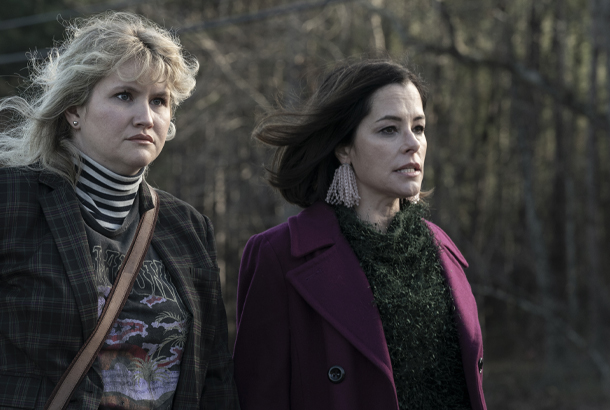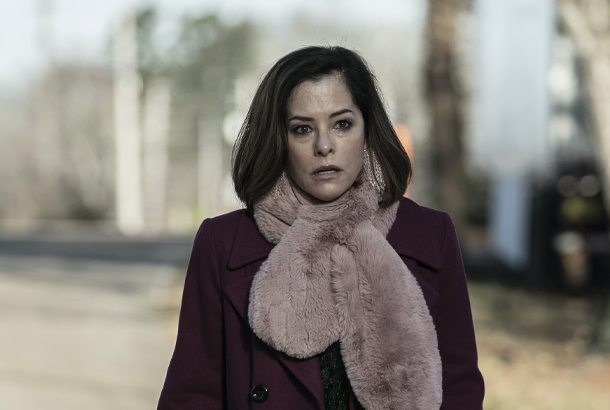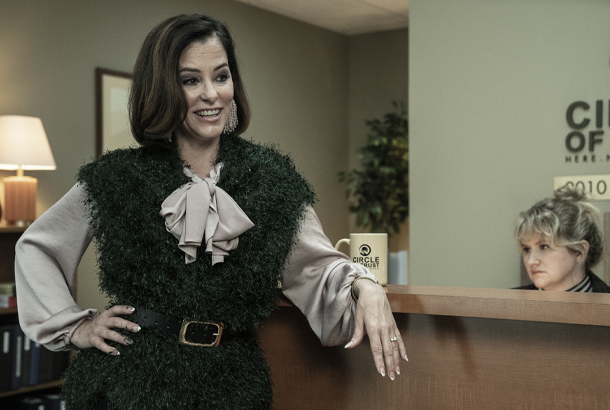The role is Posey’s most mainstream appearance yet
Parker Posey has made a career out of playing outsize, irreverent, and often deliciously mean weirdos. From the librarian It Girl in Party Girl to the most vicious of mean-girl hazers in Dazed and Confused to the neurotic Weimaraner dog mom with adult braces in Best in Show, Posey’s most memorable roles blend an off-the-deep-end wackiness with a sneaky sense of pathos. She plays big, weird characters without ever resorting to caricature.

This month, in the new Walking Dead anthology series Tales of the Walking Dead, Posey plays Blair, another comically unhinged egomaniac with a hidden human side. A passive-aggressive manager of an insurance company in 2010 Atlanta, Blair is the boss from hell, and she finds herself stuck dealing with the inconvenience of the zombie apocalypse alongside a coworker (Jillian Bell) who she despises—and who despises her right back.
“Blair is just a blazing narcissist,” Posey says, cackling gleefully. “What’s so fun about playing people who are so self-involved is that there is usually a reveal of why they are that way. We root for those people to snap out of it, and we also enjoy them, because we encounter monstrous people like that in our own lives.” Here, Posey talks more about the catharsis of rage, the value of self-mythology, and the pleasure and strangeness of aging.
It has been a crazy couple of years. Where in the world are you these days?
I am in upstate New York. I’ve been working consistently during the pandemic, so I had yet to really land. This has been my first time to be like, OK, be brave, go downstairs, go to that freezer, take that stuff out, clean that fridge, you can do it, it’s disgusting!
You weren’t home doing that kind of stress-cleaning at the beginning of the pandemic, like the rest of us?
Right before the pandemic, Rick Linklater asked me to host the Austin Film Society awards, and somehow I knew to pack more than I needed. I could just feel a shutdown coming. I have family in Austin, so there were home projects, but for them! Like, building a firepit, making a stone path, putting up a hammock. I grew up in Louisiana, so I really connected to returning to the simple, neighborly way of life. I think a lot of us are thinking about simplifying, resetting, next chapters, you know? Also, I am a woman of a certain age—so those things are also happening, which we don’t talk about, Lizzy.
We don’t?
No, we do! I’m very excited to talk about my hormones! How much time do you have?

I have all the time in the world for your hormones, Parker, but before we go there, I want to ask about your book, which came out in 2018 and which I absolutely loved.
Oh, thank you!
It’s called, You’re on an Airplane: A Self-Mythologizing Memoir. I love the idea of self-mythology as a craft and a life philosophy. Can you talk more about that?
It makes me so happy that you got that! That was really all I wanted to do with the book, to find that voice again and just talk—chitchat, entertain somebody. When I decided to write it, I wasn’t getting any acting work that was paying the bills in New York. I had to sell my apartment. I was cornered. And I think being cornered is a good time to really try to make something.
The book had me thinking a lot about Mary Karr, Harper Lee, and David Sedaris—other writers who are Southern or have larger-than-life families, or both. You write that you are a character actor because you come from “a family of characters.” Can you explain what you mean by that?
Humor and mythmaking is very Southern. It’s kind of Russian, too, in a way—there’s a theatricality. Like, when you see a Chekhov play, people are talking about their lives, and they are funny, but they are laughing and crying at the same time. You are just given the stage in this way. But it’s not caricatured; it’s persona. My dad was complicated like that. My mom was complicated like that. Southern people are complicated like that. It’s the art of expression, of performance—I mean, people make personalities. It’s something you make yourself.
You have both benefited from and been hindered by the power of the personality you’ve made for yourself. “A Parker Posey–type” is highly sought-after in Hollywood, yet I’d imagine, when it comes to getting work, there’s a golden handcuffs element to actually being Parker Posey.
Well, this is a branding culture. I would say, “OK agents, tell me why can’t I get this part in this movie? I’m totally right for it. What is the studio saying?” And they’d say, “You’re too much of an indie queen.” Our culture really doesn’t like people to step out of their lane. You don’t belong in this sandbox; you’re in that sandbox. When streaming came along, I got really fortunate.

Totally. There’s just more variety in TV these days. Your recent credits include High Fidelity, recurring roles in Lost in Space and The Staircase, and now this role as Blair. Are you a big Walking Dead fan?
I’ve never seen The Walking Dead, because anything scary with zombies—I don’t need to be adrenalized in that way. I’m sensitive, right? I’d watch it, and I’d just be, like, running along with them.
So what drew you to the part?
I was so thrilled when it came along, because I love genre. When I did Blade: Trinity and played a vampire, I was like, Really? People are going to watch other people, like, bite each other?
Little did you know…
Little did I know! Now that’s everything! I remember running into Denis O’Hare at the dog run like 15 years ago. He was doing True Blood and playing some vampire. He’s a great theater actor, and he said it feels like Shakespeare—it has the bandwidth and the space and the gravitas. You watch actors who are really good at holding a certain kind of space and directing the heaviness or the darkness, and it’s almost animalistic work. It has a flow. It’s operatic. So I was like, Well, I can’t really criticize this, because it is organic to our entertainment. We have video games and superheroes and this culture where there is cosplay. There’s Comic-Con, and there’s people feeling disenfranchised and needing to dress up. So I was like, Oh, now I get it: It’s those people. I really like those people—the nerds and the arty people and the ones who are different. I felt like I was fitting in.

Your Walking Dead character, Blair, is described as a self-obsessed, narcissistic office manager whose needs always come first.
Ha! Yeah, Blair is a zombie to the corporate ladder of success. It’s almost like she is imitating a power-playing man. It’s the hungry ghost. It’s never enough. And she’s going to take it out on everybody. But really, she hates herself. A woman who is strong like that, who you fear and who has a lot of power, it’s really playful. And it’s hopefully really funny.
Why is mean so fun?
There’s something unrestrained about it. Why were all those people obsessed with Anna Delvey? Or Elizabeth Holmes? These women show how corrupt power eats the humanity. Everyone is going, “What has she done?” And, “What is she doing to us?” But at the same time, they aren’t exactly leaving, are they?
OK, I think it’s time to talk about your hormones.
Oh! We’re at 52 minutes! That’s the end of therapy time. You’re supposed to say, “That’s enough for now, Parker.”
I think that’s a good place to stop for today, but let’s pick up on this next week.
Ha! Yes. Next week! No, I’m joking. Sorry. What were you saying?
You write in your memoir, with characteristic humor and candor, about aging. And then earlier you joked about being a “woman of a certain age.” Do you find yourself thinking about the passage of time? And about menopause?
Yeah, I am thinking about it. I am in the process of thinking about doing a show around it, because it is such a special time. It’s a hello and a goodbye, at the same time. It wakes you up at night. You’re creative, and then all of the sudden you’re exhausted. Emotions are more toward the surface. You’re over the hill. You’re looking back at the hill.
You’re on a new hill!
Yes, it’s a new hill. But it’s that period when women become more about the feminine things, like harmony and unity and nurturing and… bird-watching. And women don’t really talk about it.
I would so watch any piece of theater you did around this subject.
Thank you! I’m working on it. The arts—entertainment—should be healing. It should be a place where people recognize themselves and can have a cathartic experience and feel more a part of the world, and that their feelings are OK and they are not alone. A place that helps people feel more alive.




